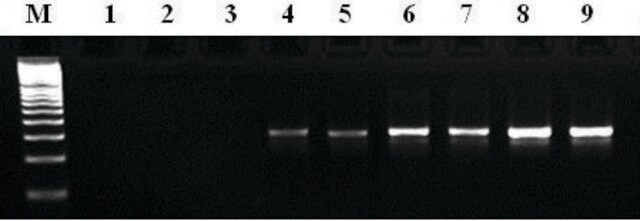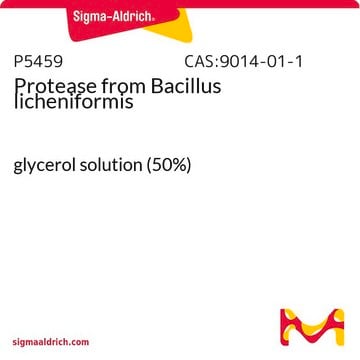11480022001
Roche
Tth DNA Polymerase
pkg of 500 U (2 x 250_U), sufficient for ≤200 reactions
Synonyme(s) :
DNA polymerase, polymerase
About This Item
Produits recommandés
Source biologique
bacterial (Thermus thermophilus)
Niveau de qualité
Produit recombinant
expressed in E. coli
Forme
liquid
Utilisation
sufficient for ≤200 reactions
Activité spécifique
5 U/μL
Conditionnement
pkg of 500 U (2 x 250_U)
Fabricant/nom de marque
Roche
Concentration
0.5-5.0 units (per reaction for PCR (standard))
2.5 units (per reaction for PCR (standard))
Paramètres
75 °C optimum reaction temp.
Technique(s)
PCR: suitable
RT-PCR: suitable
nucleic acid labeling: suitable
Couleur
colorless
pH optimal
~9.0 (25 °C)
Solubilité
water: miscible
Adéquation
suitable for molecular biology
Numéro d'accès UniProt
Application(s)
life science and biopharma
Activité étrangère
Endonuclease, none detected (up to 20 enzyme units using Lambda-DNA/ 16h/37°C)
Nicking activity, none detected ( up to 20 enzyme units using pBR322-DNA / 16h/37°C)
RNases, none detected (up to 20 enzyme units using MS II-RNA; 4h/37°C)
Température de stockage
−20°C
Catégories apparentées
Description générale
Application
- to amplify DNA fragments by polymerase chain reaction (PCR) due to its resistance towards prolonged incubations at high temperatures (95 °C)
- to label DNA fragments with either radiolabeled nucleotides, digoxigenin, or biotin, since this enzyme accepts modified deoxyribonucleotides as substrates
- to efficiently transcribe RNA targets into cDNA due to its intrinsic Mn-dependent reverse transcriptase (RT) activity
- for real time PCR
Actions biochimiques/physiologiques
Caractéristiques et avantages
- Ensures optimized polymerase chain reaction (PCR) product size for at least up to 1,000 bp in a RT-PCR reaction
- Accepts modified desoxyribonucleoside triphosphates as substrates
- Has no association with RNase H activity
- Has high thermostability to overcome the problem, typically associated with the high degree of secondary structure present in RNA
Conditionnement
Qualité
Définition de l'unité
Unit Assay: Incubation buffer for assay on activated DNA
67 mM Tris-HCI, pH 8.8 (+25 °C), 16.6 mM (NH4)2SO4, 6.7 mM MgCl2, 10 mM 2-mercaptoethanol, 0.2 mM dATP, dCTP, dGTP, dTTP each.
Incubation procedure
12.5 μg activated herring sperm DNA and 0.1 μCi [α32P] dCTP are incubated with 0.01 to 0.1 units Tth DNA Polymerase in 50 μl Incubation buffer with a paraffin oil overlay at +70 °C for 30 min.
The amount of incorporated dNTPs is determined by trichloroacetic acid precipitation followed by scintillation counting.
Volume Activity: 0.5 to 5 U per reaction of PCR (optimal)
2.5 U per reaction of PCR (standard)
Determined in the assay on activated DNA described under "unit assay".
Autres remarques
Informations légales
Composants de kit seuls
- PCR Buffer, including MgCl2 10x concentrated
- RT-PCR Buffer, coupled reaction in one tube 5x concentrated
- Mn(OAc)2-Solution 25 mM
Code de la classe de stockage
12 - Non Combustible Liquids
Classe de danger pour l'eau (WGK)
WGK 1
Point d'éclair (°F)
does not flash
Point d'éclair (°C)
does not flash
Certificats d'analyse (COA)
Recherchez un Certificats d'analyse (COA) en saisissant le numéro de lot du produit. Les numéros de lot figurent sur l'étiquette du produit après les mots "Lot" ou "Batch".
Déjà en possession de ce produit ?
Retrouvez la documentation relative aux produits que vous avez récemment achetés dans la Bibliothèque de documents.
Les clients ont également consulté
Notre équipe de scientifiques dispose d'une expérience dans tous les secteurs de la recherche, notamment en sciences de la vie, science des matériaux, synthèse chimique, chromatographie, analyse et dans de nombreux autres domaines..
Contacter notre Service technique









